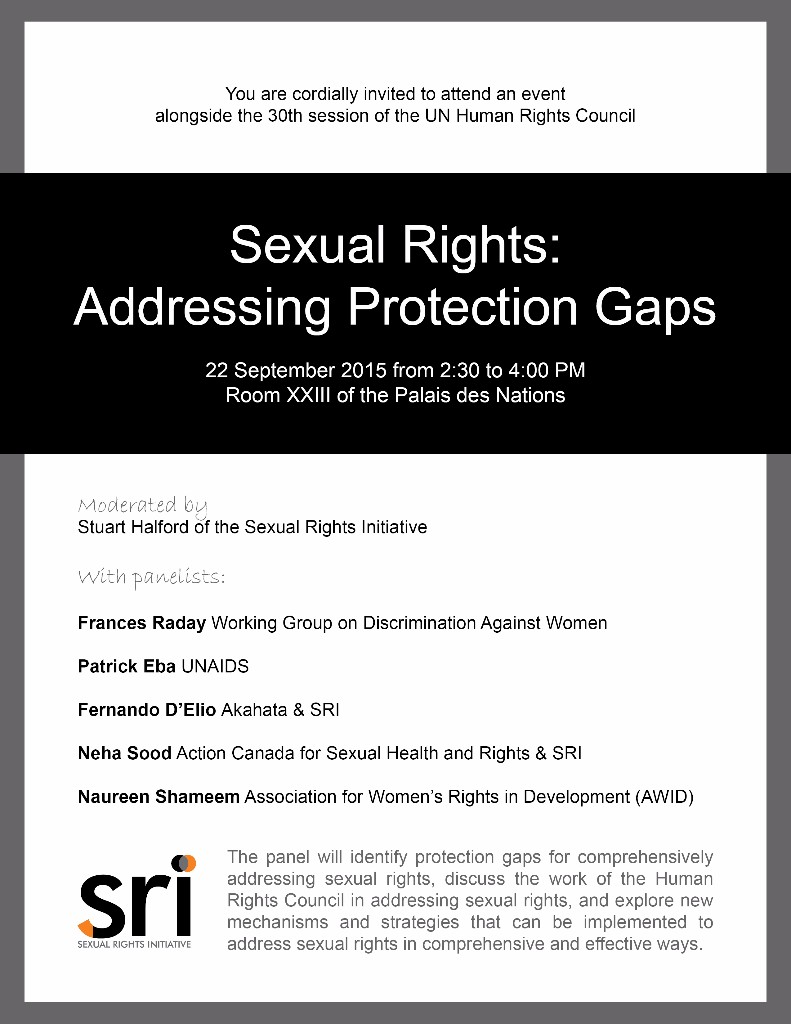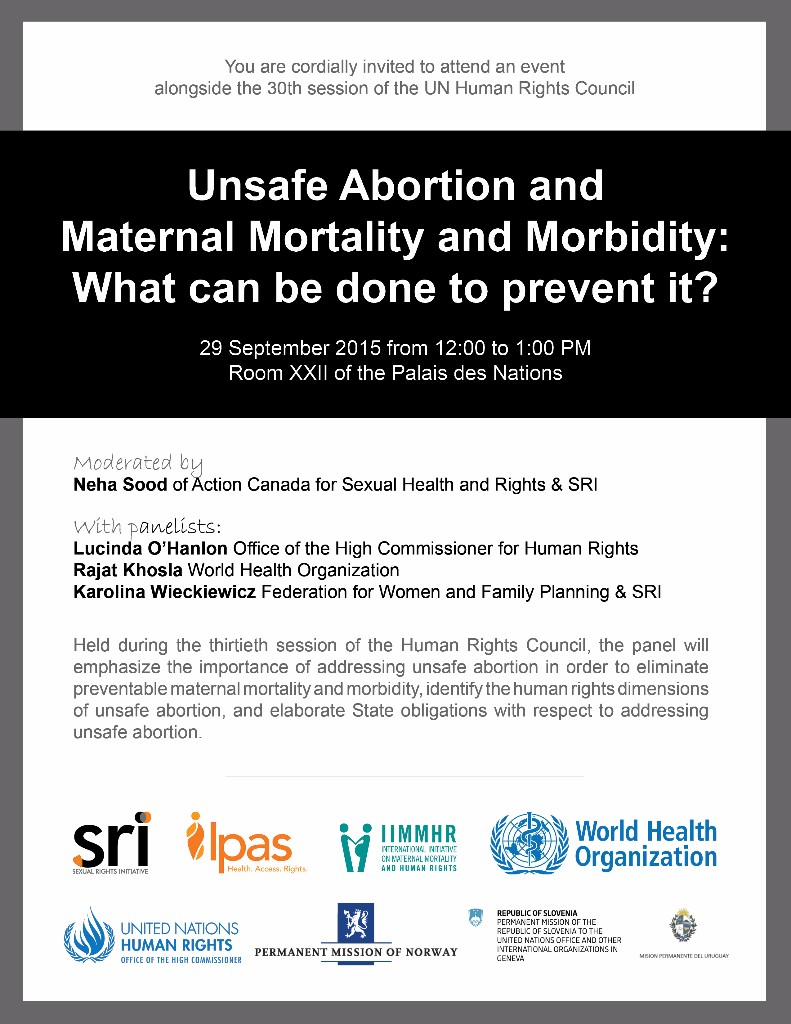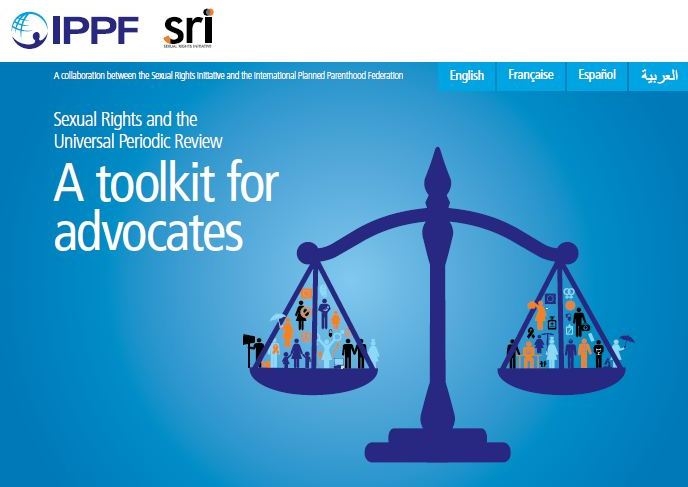HRC30: Sexual Rights Recap
The following is an overview from the 30th session of the UN Human Rights Council. It includes resolutions, panels and discussions, statements and parallel events related to sexual rights of which the SRI was engaged with during the session.
The 30th session of the UN Human Rights Council took place from the 14th of September to the 2nd of October 2015.
The HRC30 Wrap-up provides information on some of the key sexual rights related:
- Resolutions
- Panels and Discussions
- Statements
- Parallel Events
all of which the Sexual Rights Initiative (SRI) was engaged with during the session.
Sexual Rights-related Resolutions
Contribution of the Human Right Council to the High Level Meeting on HIV/AIDS in 2016 A/HRC/30/L.17
The draft resolution carried 47 co-sponsors, with 31 additional co-sponsors, totaling 78 co-sponsors at the time of adoption. Through the resolution, adopted without a vote, the Council will convene a panel discussion at its thirty-first session in March 2016 on the progress and challenges in addressing human rights issues in the context of efforts to end the HIV/AIDS epidemic by 2030.
The Council has also requested that the High Commissioner prepare a report on the panel discussion for the thirty-second session of the Human Rights Council and bring the report to the attention of the General Assembly ahead of the high-level meeting on HIV/AIDS in 2016.
Click here to read the resolution
Equal political participation in political and public affairs A/HRC/30/L.27/Rev.1
Through the resolution, adopted without a vote and co-sponsored by 61 countries at the time of adoption, the Council affirms the right of every citizen to take part in the conduct of public affairs and that no distinctions on the grounds race, colour, sex, language, religion, political or other opinion, national or social origin, property, birth or other status or on the basis of disability are permitted among citizens in the enjoyment of this right.
The Council calls upon States to take all necessary measures to eliminate laws, regulations and practices that discriminate against citizens in their right to participate in public affairs, to take proactive measures to eliminate barriers, and take appropriate measures to encourage publicly and promote the importance of participation of all citizens in political and public affairs, in particular women.
The Council further calls upon the OHCHR to organize an expert workshop to discuss existing guidance on the implementation on the right to participate in public affairs and to prepare a summary report, including recommendations, to be submitted to the Human Rights Council at its thirty-third session in September 2016..
Click here to read the resolution
Human rights and Indigenous peoples – focus: health of women and girls A/HRC/30/L.8
The draft resolution carried 24 co-sponsors, with 9 additional co-sponsors, totaling 33 co-sponsors at the time of adoption. Through the resolution, adopted without a vote, the Council will hold a half-day panel discussion on the causes and consequences of violence against Indigenous women and girls, including those with disabilities, during the thirty-third session of the Human Rights Council in September 2016. The resolution also includes a request for the Expert Mechanism on the Rights of Indigenous Peoples to prepare a study on the right to health and indigenous peoples with a focus on children and youth, and to present it to the Human Rights Council at its thirty-third session in September 2016.
Click here to read the resolution
Sexual Rights-related Panels & Discussions
Annual Discussion on Integration of Gender Perspective throughout the work of the Human Rights Council and that of its mechanisms with a focus on gender parity (HRC res. 6/30)
The panel discussion focused on gender parity as a key element of gender equality and how it contributes to the integration of a gender perspective in the work of the Human Rights Council and its mechanisms. It analysed the main challenges to achieving parity in international human rights bodies, in particular the Human Rights Council and its mechanisms, and identified key measures to improve gender balance as well as existing initiatives and successful practices in order to make concrete recommendations.
The SRI delivered an oral statement to the panel, raising concern over the gender imbalance in the UN system, including in most UN committees, and asked the panelists to elaborate on and discuss the challenge of relegating women to stereotyped roles and responsibilities and ways to overcome this. The statement also pointed out that gender parity in representation includes persons who are not gender conforming. The discussion of gender has focused solely on women, excluding transgender and other gender non-confirming people. As such, the SRI asked the panelists how one can expand the scope of discussion to go beyond binary ideas of gender at the very least in the UN system.
Click here to read the SRI statement
SRI Oral Statements
Outcomes from the 22nd session of the Universal Periodic Review (UPR) were reviewed during the 30th session of the HRC. The following fourteen countries were reviewed: Andorra, Belarus, Bulgaria, Croatia, Honduras, Jamaica, Liberia, Libya, Malawi, Maldives, Marshall Islands, Mongolia, Panama, and the United States of America (USA).
SRI delivered statements to seven countries:
SRI also made statements on:
- Item 8: Follow-up to and implementation of the Vienna Declaration and Programme of Action
- Annual discussion on the integration of a gender perspective throughout the work of the Human Rights Council and that of its mechanisms – with a focus on gender parity
Click here for SRI statement transcripts and video footage
SRI Parallel Events

Click here for event highlights

Click here for event highlights

Read the SRI & IPPF UPR
Toolkit for Sexual Rights Advocates
Available in
English, French, Portuguese, Spanish & Arabic.
Created in 2006 to replace the United Nations Human Rights Commission, the Human Rights Council is the foremost international body for the promotion and protection of human rights and can be used to bring substantial pressure on governments to take steps to implement human rights norms. The Human Rights Council is comprised of governments of countries that are members of the United Nations and is an important venue to develop and advance sexual rights as a critical part of the international human rights framework.